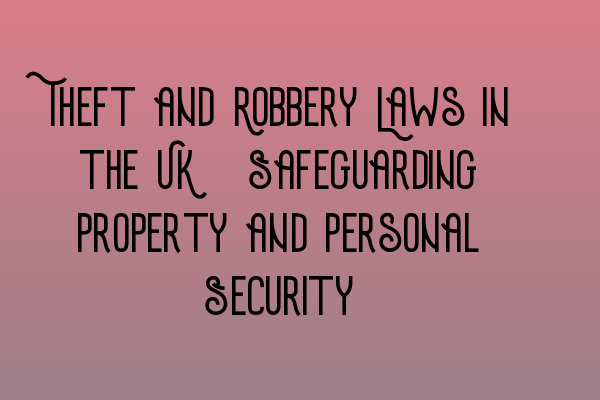Theft and Robbery Laws in the UK: Safeguarding Property and Personal Security
In the United Kingdom, theft and robbery are serious offenses that can have severe legal consequences. Understanding the laws surrounding theft and robbery is crucial to safeguarding property and personal security. This article will provide an overview of the relevant laws and discuss important considerations for individuals and businesses.
Theft Laws
Theft is the act of dishonestly appropriating property belonging to another person with the intention to permanently deprive the owner of it. It is a criminal offense under the Theft Act 1968. The act defines various forms of theft, including:
- Simple theft, where property is taken without any force or threat of force.
- Aggravated theft, where force or the threat of force is used during the commission of the offense.
- Robbery, which is a specific form of theft involving the use of force or the threat of force against the victim.
It’s important to note that theft can be committed against individuals, businesses, or the government. Regardless of the target, theft is a serious crime that carries significant penalties, including imprisonment and fines.
For more information on theft laws and how they apply in specific cases, it is advisable to consult with a qualified criminal defense lawyer. They will be able to provide personalized advice and guidance based on the specific circumstances.
Robbery Laws
Robbery is a more serious offense than theft because it involves the use or threat of force. Under the Theft Act 1968, robbery is defined as theft accompanied by violence or the threat of violence. The key distinction between theft and robbery is the presence of force or the threat thereof.
Robbery is a grave offense that poses a threat to personal safety and security. The law treats it as an aggravated form of theft due to the potential for harm caused to the victim. The penalties for robbery are more severe than those for simple theft and may include a lengthy prison sentence.
If you or someone you know is facing robbery charges, it is crucial to seek immediate legal representation. A skilled criminal defense lawyer will assess the evidence, build a strong defense, and advocate for the best possible outcome.
For further guidance on robbery laws and related legal matters, feel free to explore our comprehensive SQE 1 Practice Exam Questions and SQE 1 Practice Mocks FLK1 FLK2. These resources are designed to help individuals prepare for the SRA SQE exams and gain a deeper understanding of criminal law and practice techniques.
Protecting Property and Personal Security
Safeguarding property and personal security is essential for individuals and businesses alike. There are several proactive measures that can be taken to minimize the risk of theft and robbery:
1. Secure Premises
Ensure that physical premises have adequate security measures in place, such as locks, alarms, and surveillance systems. Regularly assess and upgrade security systems to stay ahead of potential threats.
2. Employee Awareness
Train employees on the importance of security and provide them with guidelines on how to identify and respond to potential threats. Encourage reporting of suspicious activities or individuals.
3. Cybersecurity
Protect digital assets by implementing robust cybersecurity measures. Use strong passwords, regularly update software, and educate employees about online security risks.
4. Insurance Coverage
Obtain comprehensive insurance coverage to protect against financial losses resulting from theft or robbery. Review policies regularly to ensure they adequately cover the value of assets.
To delve deeper into protecting property and personal security, our SQE 2 Preparation Courses are designed to equip aspiring solicitors with practical knowledge and skills in criminal law and practice. These courses are tailored to provide a comprehensive understanding of legal principles and practical strategies for success.
Understanding theft and robbery laws in the UK is vital for safeguarding property and personal security. Theft is the act of dishonestly appropriating property, while robbery involves the use or threat of force during the commission of the theft. Both offenses carry severe penalties, and it is essential to seek legal advice if facing charges.
Take proactive steps to protect property and personal security by implementing effective security measures, promoting employee awareness, prioritizing cybersecurity, and obtaining proper insurance coverage.
For more information on criminal law and practice and to stay updated on the latest SRA SQE exam dates, visit our website.
Sources:
